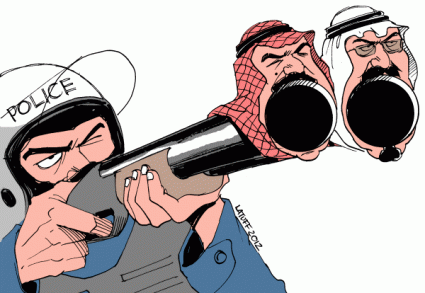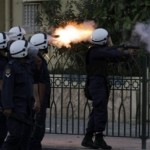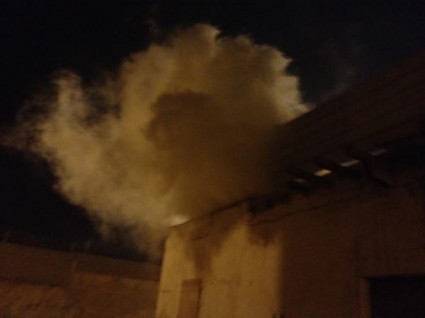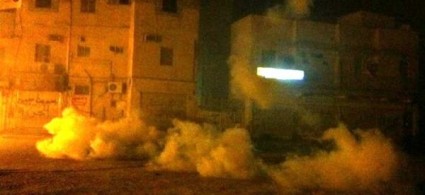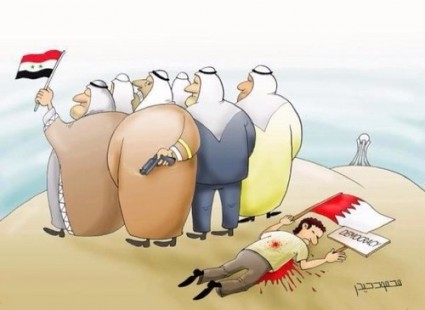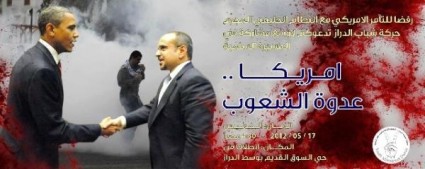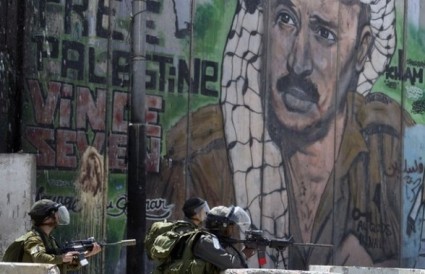Al Khawaja Should Be Released, Not Force Fed
Al Khawaja Should Be Released, Not Force Fed
2 May, 2012 – By Brian Dooley – Human Rights First
Sadly, Bahrain is looking more and more like Northern Ireland of the late 1960s, when the government there refused to reform. As a result peaceful pro-democracy protestors, frustrated by the lack of progress, were tempted to react to police violence with violence of their own.
I’ve noted the similarities between Irish and Bahraini political history before. This week reports emerged that prominent Bahraini human rights defender and political prisoner Abdulhadi Al Khawaja is being force-fed after almost three months on a hunger strike. (In 1917 the British authorities made a terrible mistake by force feeding an Irish political prisoner, Thomas Ashe, killing him in the process and triggering a fresh wave of recruits into the revolutionary movement.)
Last year, Al Khawaja was sentenced to life in prison after being arrested, tortured and given an unfair trial in a military court after he took part in the pro-democracy protest. He is best known internationally for his human rights activism (including as a staff member for Front Line Defenders, a human rights NGO based in Dublin). On Sunday, after a week of rumors that he had died, the authorities allowed his family to visit him. His daughter Maryam tweeted that “he had been drugged, tied to the bed, forcibly fed with a nasoenteric tube.” A nasoentric tube is one that is pushed up through the nose and into the stomach. It was the use of a nasoenteric tube that killed Thomas Ashe. The Bahrain authorities deny feeding Abdulhadi against his will, although the BBC reported yesterday that Abdulhadi told them he had been force-fed. …more
May 17, 2012 No Comments
Carnage inflicted on Bahrain Protesters, Under Charge of US and UK Trainer-Advisers, John Timoney and John Yates
May 17, 2012 No Comments
U.S. arms Bahrain, steps up ‘readiness’ for regional war
U.S. arms Bahrain, despite human rights concerns
16 May, 2012 – By Aaron Mehta – Center for Public Integrity
While much of the world’s focus has been on the civil war in Syria, the island kingdom of Bahrain continues to shake with anti-government protests that started in last year’s “Arab Spring.” While it has received less attention, human rights groups have documented ongoing government abuses.
Those concerns were enough to put a halt on a weapons sale from the U.S. to Bahrain last fall, but the Obama administration announced last Friday that it has decided to proceed with the sale, despite the ongoing upheaval and protests from both Congress and human rights groups.
“Bahrain is an important security partner and ally in a region facing enormous challenges,” wrote Pentagon spokeswoman Victoria Nuland in an official statement announcing the sales. “Maintaining our and our partners’ ability to respond to these challenges is a critical component of our commitment to Gulf security.”
In a nod to the human rights concerns, the Pentagon said the weapons being sold to Bahrain will not include anything that could be used against protestors. Instead, it would be a package of equipment geared towards protecting the country from external threats, including engines for F-16 planes and harbor security boats.
“Sales of items that are sort of predominantly or typically used by police and other security forces for internal security, things used for crowd control, we’re not moving forward with at this time,” said an unnamed administration official on a conference call last Friday. “That would include things like tear gas, tear gas launchers, stun grenades – those sorts of things.” …more
May 17, 2012 No Comments
Obama anti-democracy support of al Khalifa facilitates crisis of anti-US sentiment by democracy seekers
May 17, 2012 No Comments
Indiscriminate nightly village gassing and raids continue unabated – collective punishment
May 17, 2012 No Comments
Bahrain Security Forces Not practicing Crowd Control, Victim Shot with Intent to Kill
May 17, 2012 No Comments
Secretary Clinton’s Foreign Policy Incompetence and US Oil Greed trumps Nuclear Non-Proliferation Treaty
U.S. Sides With Israel’s Nukes Over Iran’s Lack Thereof
By Russ Wellen – 14 May, 2012 –
In the Hindu on May 8, we catch Hillary Clinton putting too fine a distinction on the Israel-Iran rivalry.
Drawing a distinction between Iran, which has violated provisions of the Non-Proliferation Treaty (NPT), and Israel, which hasn’t signed it, United States Secretary of State Hillary Clinton said here on Monday that the latter has “made numerous overtures to try to have a peaceful resolution” to the situation in the Middle-East.
Of course, logic dictates that an overriding distinction be drawn between a state with an unacknowledged nuclear-weapons program that never signed the nuclear Non-Proliferation Treaty (NPT) and one with not only no nukes, but no development program and that has signed the NPT, with no evidence of substantive violations. Secretary of State Clinton, however, attempts to suggest that Israel’s other virtues more than compensate for an illegal nuclear arms program (not that we believe, according to international law, that any nuclear program is exactly legal). First, she claims that Israel “‘has made numerous overtures to try to have a peaceful resolution’ to the situation in the Middle-East.”
It’s unclear about what Ms. Clinton is speaking: Iran or the Palestinian people? Conflating the two is shoddy thinking, especially for a top official. In any event, are Israel’s overtures more numerous — or genuine — than Iran’s or Palestine’s? We’ll leave it to Middle-East experts to divvy them up. But that’s not Ms. Clinton’s only defense for favoring Israel over Iran on the issue of nuclear weapons. …more
May 17, 2012 No Comments
America Shifts Gear for War on Iran
The covert war on Syria is an integral part of the US-led covert war on Iran
AMERICA SHIFTS GEAR FOR WAR ON IRAN
by Finian Cunningham – Global Research – 17 May, 2012
America’s war plans for full spectrum dominance in the oil-rich Middle East and Central Asian region shifted up a gear this week with three significant and inter-related developments.
Forget about viewing events in countries as separate incidents. Syria, Iran and the Gulf monarchies are closely bound up in US-led war plans in the Middle East that are aimed at projecting American political, economic and military power across this vital region and beyond. Events today are but a continuum with US wars of conquest in Iraq, Afghanistan, Lebanon and Libya as part of an unfolding agenda for hegemony.
First, this week it emerged that the purported Kofi Annan Peace Plan is all but dead. For the past four weeks, the US-led foreign powers have done everything to make sure the supposed peace plan would fail, from Western governments and media constantly excoriating Syrian President Bashar Al Assad for allegedly not abiding by the ceasefire, while these same powers have assiduously supported mercenary groups to go on a full terror assault involving no-warning car bombs and shootings.
US officials are not yet declaring the Annan ceasefire over, but actions on the ground speak volumes. An influx of more powerful weaponry is reported to now have reached the so-called Syrian rebels. The mercenaries trying to topple the Assad government are largely foreign jihadist elements from Libya, Iraq and Saudi Arabia. In weeks prior to the 12 April ceasefire, the Syrian government forces were gaining the upperhand, routing these armed groups from their base in the city of Homs.
Under the strictures of the ceasefire, which were tightly and unilaterally applied by Western governments and media to the conduct of the Syrian army, the armed opposition groups appear to have taken advantage of the respite to inflict their worse and to reorganise. Two massive car bombs in the capital, Damascus, on 10 May killed 55 and injured more than 400. The blasts were so powerful they left two large craters in the roads.
This week the foreign-backed mercenaries were reported to have killed 23 Syrian army troops in the town of Rastan, near Homs. The surge in deaths among civilians and security forces reflects the increased firepower that is now making its way into the hands of the mercenaries.
According to the Washington Post, the Gulf monarchies, mainly Saudi Arabia and Qatar, are financing the new shipments of weapons. This is drawn from the war-chest of $100 million that was pledged by the US-backed Arab autocrats at the conference in Istanbul at the beginning of April. Officially, the Obama administration is maintaining a cynical fiction that it is only supplying “non-lethal material” to the Syrian armed groups. But it is the US that is now assuming the crucial lead role of overseeing the distribution and deployment of new weapons flowing into Syria.
“The US contacts with the rebel military and the information-sharing with Gulf nations mark a shift in Obama administration policy as hopes [sic] dim for a political solution to the Syrian crisis. Many officials now consider an expanding military confrontation to be inevitable,” reports the Washington Post on the 16 May. …more
May 17, 2012 No Comments
If Bahrain is “up for grabs” why shouldn’t Iran annex it? – it certainly has greater historic claim
Iran’s Khamenei-run newspaper calls for Bahrain annexation after GCC union talks
16 May 2012 – By Saud al-Zahed and Elia Jazaeri – Al Arabiya
Iran’s most conservative newspaper Kayhan, supervised by the office of Supreme Leader Ayatollah Khamenei, called for the annexation of Bahrain following union talks by GCC member states.
In response to a meeting held in the Saudi capital Riyadh by heads of state of the six members of the Gulf Cooperation Council (GCC), which focused on a possible union especially between Saudi Arabia and Bahrain, Kayhan published Tuesday a report that described Bahrain as “part of Iran” and called for its annexation.
The paper, however, did not specify the necessary measures that need to be taken towards this end.
According to Kayhan, the union between Saudi Arabia and Bahrain is a “dangerous conspiracy” that aims at “increasing tension in the Middle East.”
Meanwhile, Saudi Foreign Minister Saud al-Faisal on Monday called upon Iran to stop interfering in relations between Saudi and Bahrain. His comments came at a press conference with GCC secretary general.
Talks of a GCC union stirred controversy in Iranian media with several newspapers describing the initiative as an attempt to forge an alliance against Iran.
Members of the Iranian parliament also voiced their concern over the possible union with 190 of them issuing an angry statement condemning the initiative and also focusing on talks about a Saudi-Bahraini union.
Calls for annexing Bahrain to Iran are not new. The proposal was put forward several times in the past. One of the most famous annexation suggestions was presented by former Parliament Speaker Ali Akbar Nateq Nouri.
Bahrain, which is historically and demographically part of the Arab world, gained independence from British rule in 1971. At the time, Iran’s last Shah Mohammed Reza Pahlavi called for the annexation of this strategic Gulf island, yet stopped the calls after a sweeping majority of its residents voted for independence in a U.N.- supervised referendum.
However, Kayhan claimed in its report that the majority of Bahrainis want to be annexed to Iran and suggested that Bahrain “be returned to its motherland” instead of entering a union with Saudi Arabia.
Calls for the annexation of Bahrain were renewed following the 1979 Islamic Revolution that toppled the Shah.
Iranian authorities have been criticized for supporting anti-government protests in Bahrain while supporting the Syrian regime in its brutal crackdown on peaceful protestors.
On the other hand, Bahrain is seen as having taken several steps towards democratic governance since March 1999 when Sheikh Hamad bin Eissa Al Khalifa came to power.
During his rule, parliamentary life was back to Bahrain for the first time since 1975 and women obtained the right to vote. Political prisoners were released in a step hailed by Amnesty International as “positive.” ..source
May 17, 2012 No Comments
Syria Captures Foreign Mercenaries as US-Saudi backed Wahhabists(al-Qaida) try to establish New State
Assad says Syria is fighting foreign mercenaries
16 May, 2012 – By Bassem Mroue – Associated Press
BEIRUT: In his first interview in nearly half a year, Syrian President Bashar Assad claimed Wednesday that his regime had captured foreign mercenaries who were fighting for the opposition in a bid to show his forces were fighting terrorists instead of pro-democracy activists.
Assad spoke in an interview broadcast on Russian state news channel Rossiya-24, signaling he has no intention of softening his position despite an international peace plan that includes a cease-fire.
He said the decision by the Syrian National Council to boycott parliamentary elections earlier this year discredited the opposition group.
“To call for boycotting the elections, that’s the equivalent of calling for a boycott of the people,” Assad said. “And how can you boycott the people of whom you consider yourself the representative?
“So I don’t think that they have any kind of weight or significance within Syria,” Assad said in remarks translated into Russian.
Assad said religious extremists and al-Qaida members from abroad are among the forces fighting his government.
“There are foreign mercenaries, some of them still alive. They are being detained and we are preparing to show them to the world,” he said.
Assad’s last interview was with ABC’s Barbara Walters in December.
It was significant that Wednesday’s interview was given to Russia state media. Russia has been Syria’s most powerful and loyal ally over the course of the uprising, selling weapons to the regime and blocking action against Damascus at the U.N. Security Council.
The Assad regime’s crackdown on a 14-month-long popular uprising has left thousands dead and prompted international condemnation. More than 200 U.N. observers have been deployed throughout Syria to monitor a cease-fire agreement, which has been repeatedly violated by both sides since it took effect on April 12.
In a fresh blow to the peace effort, the international monitors have been caught up in the violence as well.
May 17, 2012 No Comments
Syrian [Inter]National Council fractures amid local ambitions for a ‘Free Syria’
SNC head quits as Syrian opposition divides
17 May, 2012 – Al Akhbar
The head of the opposing Syrian National Council offered his resignation on Thursday after the rival Local Coordination Committees threatened to withdraw from the council.
Burhan Ghalioun declared on he was ready to step down from the SNC presidency when an alternative is available, only two days after being reelected to the post.
“I declare my resignation as soon as a replacement is found through elections or consensus,” Ghalioun told Reuters.
Ghalioun, who was re-elected on Tuesday to serve his third term as head of the SNC, added that he is “not ready to be a cause for division. The revolution is above personalities.”
His resignation followed a statement issued on Thursday by The Local Coordination Committees – a major activists group, working both inside and outside Syria – threatening to withdraw from the SNC.
“After refusing to participate in the Council’s activities for the past two months, the last of which was the general assembly’s meeting in Rome, we find in the deteriorating council a reason for further steps, which might start with suspending our membership to withdrawing,” the statement said.
The LCC claimed the leadership of the council, Syria’s largest opposition umbrella group, had been monopolizing decision-making powers. The statement mentioned the re-election of Burhan Galioun to a third term as one example of the lack of democracy.
The statement pointed also to “the marginalization of most of the members of the movement and of the council’s general assembly.”
It also condemned the “political incompetence” of the council and the “lack of consensus between its vision and that of the revolutionaries.”
Ghalioun’s resignation will lead to speculation about potential successors, with George Sabra, a Christian council member who ran against Galioun in Tuesday’s elections, a prime candidate. …more
May 17, 2012 No Comments
Turkish and Saudi Designs for Carving Up Syria
Saudi Arabia advocates a Syrian Sunni Islamist regime & is establishing ties with the more radical elements in the country”
17 May, 2012 – Arab News Blog
“…Although Saudi Arabia and Turkey share a common goal in Syria, there are some tensions between their positions. First, for Turkey, managing the Syrian crisis is not a way to limit Iranian influence; instead, it is a means of protecting Turkey from chaos on its southern border. Refugees have already started flooding into Turkey — and the longer the conflict drags on, the larger the burden Ankara will have to shoulder. Further, the influence of the Turkish Kurdish party on some Syrian Kurds is worrisome for Ankara.Moreover, the Saudi and Turkish visions for post-Assad Syria differ. Saudi Arabia advocates a Sunni Islamist regime and is establishing ties with the more radical elements in the country. Turkey, on the other hand, favors the participation of all actors. Ankara is engaging and supporting the Muslim Brotherhood, while also pressuring the group to accept a more participatory and representative Syria to prevent civil war in the post-revolution era.
In the meantime, Saudi Arabia’s involvement in Syria threatens to undermine Turkey’s “zero problems” foreign policy. Saudi Arabia is already casting the conflict in Syria as a sectarian one. Thus, Ankara’s close cooperation with Riyadh — and the Syrian Muslim Brotherhood — places Turkey squarely within the so-called Sunni camp. Such a development would limit Turkey’s soft power in the region. In other words, although opportunities for rapprochement between Saudi Arabia and Turkey arise from time to time, there are hard limitations to their relationship. They want different things in the region, and have different policies for getting them. On the other hand, as long as there are clear economic benefits in this bilateral relationship, both sides will gloss over their differences as long as they can.“ …more
May 17, 2012 No Comments
Bahrain’s fool hearted Ambassador, Noono rambles stupidly about Iranian threat
Bahrain’s Ambassador to the United States, Huda Noono, the first Jewish Ambassador of an Arab country, addressed Wednesday the European Jewish Parliament in Brussels.
Bahrain’s Ambassador to the US: ‘Iran is a threat to the whole region’
Yossi Lempkowicz – 17 May, 2012 – European Jewish Press
BRUSSELS (EJP)—Iran is a threat not only for Israel but for the whole region, said Bahrain’s Ambassador to the United States, Huda Noono, the first Jewish Ambassador of an Arab country, in an interview with EJP.
“We are all facing the same threat, which is Iran. We have to cooperate and work together and we need the support of Europe,” she said in Brussels where she addressed on Wednesday the General Assembly of the European Jewish Parliament.
She added, “I hope that the European Jewish Parliament can play a role as a ‘bridge’ between the European Parliament and Bahrain.” “We need your support as Bahrein is going forward in the process of reforms.”
Noono is part of the small Jewish community of Bahrain which consists in just 37 people, most of whom are the descendants of immigrants from Iraq whose families have lived in the tiny Gulf island country since ancient times.
In July 2008, King Hamad bin Isa Al Khalifa appointed her Bahrain’s ambassador to the United States. As such, she became the first Jewish ambassador of any Arab country and also the first female Bahraini ambassador to the United States.
“Since 1979, Iran has tried to export its revolution to Bahrain whom it considers as its 14th province,” the Ambassador said in the interview.
“It is very important that with Europe we share mutual geo-strategical interests in the region as we face the same external threats.” “We have to address the message to Iran not to muddle in the region.”
Bahrain’s Sunni royal family has accused Iran of supporting mass protests by the nation’s Shia majority. The country has seen intermittent protests for more than a year demanding political reforms.
“The Islamic party wants to transform Bahrain into a theocraty,” Ambassador Noono explained.
“Not all the Arab countries are going through the Arab Spring. What is happening in my country is not part of the Arab Spring. It is something totally different. It has become a sectarian issue,” she added.
She insisted that in Bahrain all minorities, including Jews, coexist and enjoy freedom of religion. “We have a synagogue.”
Although Bahrain has no diplomatic relations with Israel, she invited Jews of Europe to come to the country. “We are open for this.”
A delegation from the European Jewish Parliament is expected to travel to the country in November.
The two-day plenary session of the 120-member Parliament, which took place in the European Parliament, expressed worries about the impact of the economic crisis on the rise of extremism, populism and anti-Semitism in Europe, citing the recent electoral gains of a neo-Nazi party in Greece an annual march of former Waffen SS in Latvia. …source
May 17, 2012 No Comments
Free Syria
May 17, 2012 No Comments
Bahrain’ brutal regime called to account at (UPR) Human Rights Council in Geneva on 21 May
Bahrain must commit to accountability at Universal Periodic Review
17 May, 2102 – Amnesty Australia
The Bahraini government must commit to releasing prisoners of conscience and ensuring true accountability for the human rights violations committed since February 2011, Amnesty International said, ahead of Bahrain’s review before the Universal Periodic Review (UPR) Working Group of the Human Rights Council in Geneva on 21 May.
Bahrain was the very first country to undergo a UPR process four years ago and on that occasion the government engaged very constructively, including by making numerous voluntary commitments and by responding positively to recommendations to take measures to address discrimination against women and to limit restrictions on freedom of expression. However, progress towards implementing those commitments and recommendations has been very slow.
More significantly still, the human rights situation in the country has recently deteriorated into a crisis, following the Bahraini authorities’ heavy-handed response to widespread pro-reform protests that started in February 2011.
At least 60 people have been killed since February 2011 in connection with the protests, and the security forces continue to use excessive force against the protesters. Detainees have been subjected to torture and other ill-treatment in unofficial detention places. Scores of persons tried unfairly in military courts and sentenced to long-term prison sentences remain behind bars despite being convicted only for exercising their rights to freedom of expression and association.
In late June 2011, the King of Bahrain established the five-member Bahrain Independent Commission of Inquiry (BICI) to investigate alleged human rights violations during the protests. The BICI was led by Professor Cherif Bassiouni and comprised experts of internationally recognised independence, integrity and expertise. On 23 November 2011 the BICI submitted its report to the King and made detailed practical and legislative recommendations. The report confirmed that gross human rights violations had been carried out.
The Bahraini government promised full implementation of the BICI recommendations, including accountability for human rights violations. Despite some institutional and other reforms, the government’s implementation of the BICI recommendations that relate to accountability for human rights violations has been inadequate. While 11 low-ranking policemen are currently on trial for involvement in human rights abuses, no senior member of the security forces responsible for the violations, including the National Security Agency and Bahrain Defence Force, is being brought to account. …more
May 17, 2012 No Comments
Prsident Obama lacks imagination uses 19th Century “Big Stick Diplomacy” nonsense to threaten Iran before Nuke talks
Plans to strike Iran “ready”, says U.S. Israel envoy
17 May, 2012 – By Maayan Lubell – Reuters
OCCUPIED JERUSALEM: U.S. plans for a possible military strike on Iran are ready and the option is “fully available”, the U.S. ambassador to Israel said, days before Tehran resumes talks with world powers which suspect it of seeking to develop nuclear arms.
Like Israel, the United States has said it considers military force a last resort to prevent Iran using its uranium enrichment to make a bomb. Iran insists its nuclear program is for purely civilian purposes.
“It would be preferable to resolve this diplomatically and through the use of pressure than to use military force,” Ambassador Dan Shapiro said in remarks about Iran aired by Israel’s Army Radio on Thursday.
“But that doesn’t mean that option is not fully available – not just available, but it’s ready. The necessary planning has been done to ensure that it’s ready,” said Shapiro, who the radio station said had spoken on Tuesday.
The United States, Britain, France, Russia, China and Germany have been using sanctions and negotiations to try to persuade Iran to curb its uranium enrichment, which can produce fuel for reactors, medical isotopes, and, at higher levels of purification, fissile material for warheads.
New talks opened in Istanbul last month and resume on May 23 in Baghdad.
Israel, which is widely assumed to have the Middle East’s only atomic arsenal, feels threatened by the prospect of its arch-foe Iran going nuclear and has hinted it could launch preemptive war.
But many analysts believe the United States alone has the military clout to do lasting damage to Iran’s nuclear program.
May 17, 2012 No Comments
STOP THE WAR – No to NATO – 19 May, 2012
No to NATO • Don’t Attack Iran
Troops Out of Afghanistan
No Intervention in the Middle East
Protest and Rally Saturday 19 May, 1pm
US Embassy Grosvenor Square London W1
Called by Stop the War Coalition and CND
SPEAKERS: • Mitra Quayoom • Manuel Hassassian (Palestinian Territories’ diplomatic representative) • Murad Querishi (London assembly member) • John McDonnell MP • Sami Ramadami • Lindsey German • Kate Hudson • Tony Benn • Mohammed Sadiq from Justice for Bahrain • a speaker from Hands off Somalia • Abbas Edalat from CASMI • Jeremy Corbyn MP • Sabah Jawad
Why we’re saying NO TO NATO on Saturday 19 May
Why we’re protesting in London and Chicago
On May 20/21, Barack Obama will host the 25th summit of the North Atlantic Treaty Organisation (NATO) in Chicago.
The United States and Britain are the lynchpins of the NATO coalition and responsible for more wars of agression around the world than any other powers.
United National Antiwar Coalition (US) and Stop the War Coalition (UK) will therefore be holding major protests in Chicago and London to say no to a new war on Iran; to oppose the threat of intervention in Syria; and to call for the immediate withdrawal of troops from Afghanistan.
May 17, 2012 No Comments
Insult to Injury, Regime Security Forces Vandalize Political Prisoner, Nabeel Rajab’s, Home
May 17, 2012 No Comments
President Obama Please Stop your War against Democracy in Bahrain
May 17, 2012 No Comments
Hemmed in by Mayhem of his own making can Saudi King Abdullah escape self made hell?
“When Abdullah took over, at the beginning, there were positive feelings,” he said in a phone interview. “People thought things were changing, that we could express ourselves. Unless institutions are put in place, the changes don’t mean anything.”
A royal decree last year banned media deemed to violate Islamic law and threaten internal security, the official Saudi Press Agency reported. Publications that break the rules can be fined or closed.
Saudi Arabia Marks King’s Accession as Region Applies Pressure
By Glen Carey – 16 May, 2012 – Bloomberg
As he begins his eighth year on the throne, King Abdullah of Saudi Arabia confronts a region facing unprecedented political changes as well as mounting social pressures at home.
The country marks the seventh anniversary of Abdullah’s accession today, according to the Islamic calendar. Seven years ago, “people pledged allegiance and loyalty to the king and united in support of him,” the official Saudi Press Agency said. Based on the lunar cycle, August 1, 2005 corresponds to May 17.
Abdullah, 88 this year, has kept at bay the popular movements that toppled leaders in Yemen, Tunisia, Egypt and Libya. With unrest threatening to spread to the Persian Gulf states, he drew up a $130 billion spending package to help alleviate issues such as unemployment and deployed troops to Bahrain to crush a Shiite-led uprising. At home, the son of King Abdulaziz, the founder of the kingdom, has pursued policies to create jobs and build state institutions.
“The regional environment has been difficult,” said Crispin Hawes, director for the Middle East and North Africa at Eurasia Group in London. “Not only has Abdullah lost a significant ally in Hosni Mubarak, but the emergence of Mahmoud Ahmadinejad in Iran, continuing upheaval in Iraq and more recently the situation in Syria and Bahrain have posed significant direct challenges.”
Saudi Arabia’s economy will expand 3.9 percent this year, Jeddah-based National Commercial Bank said, after growing 6.8 percent last year.
‘Reasonable’ Growth
With Abdullah’s backing, the government has “accomplished reasonable economic growth,” Jarmo Kotilaine, chief economist at Jeddah-based National Commercial Bank, said in a phone interview. “They need to lay the foundation for a diverse economy to absorb new job-seekers.”
Since taking power, Abdullah has implemented a $400 billion fiscal stimulus package in late 2008 and a $384 billion, five- year spending plan for education, housing and transportation in August 2010. He imposed quotas in June forcing employers to cut foreign staff to get Saudis working, and allowed women to work in lingerie outlets. …more
May 17, 2012 No Comments
Mr. President please stop enabling the murder of Bahraini Citizens
May 17, 2012 No Comments
Free Palestine – Nakba, May 2012
May 17, 2012 No Comments

